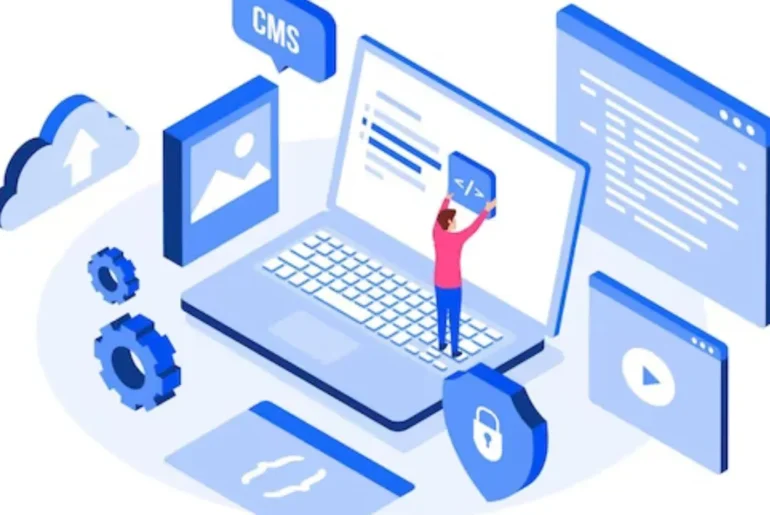Online sales of goods are on higher levels. Online businesses must not only keep up with new trends but also remain ahead of the curve by implementing cutting-edge tactics, as the worldwide eCommerce market will have reached $7 trillion by 2025. If you haven’t already, now is the perfect time to migrate some or all of your business processes online. Your e-commerce store’s management platform will be essential to its success.
Thinking about where to begin?
So, Let’s start learning what is Ecommerce managed WordPress Website ,its Benefits, Why we choose the WordPress for our Online business and its comparisons with other online Websites.
What is an Ecommerce Managed WordPress Website
An ecommerce managed WordPress website is a dynamic online platform that combines the power of WordPress with specialized ecommerce features. This combination allows businesses to create, manage, and scale their online stores effectively.
Why Choose WordPress for Ecommerce ?
You’ll off to a good start if you can find an appropriate ecommerce platform!
Given its popularity and usage, WordPress is one of the best platforms for your website or e-commerce store. While there are many solutions available, WordPress is a versatile and strong content management system (CMS) that is renowned for its user-friendliness, adaptability, and customization features. WordPress is excellent for building any form of website, and it has specialized themes to aid in speedy setup. Another option is to use a E commerce Managed WordPress website service that offers ready-to-use e-commerce themes that are tailored to your requirements.
User-Friendly Interface
WordPress offers a user friendly interface, making it easy for even non-technical users to manage their online store.
Vast Plugin Library
With thousands of plugins available, you can add various functionalities to your ecommerce site.
SEO-Friendly
WordPress is inherently SEO-friendly, helping your site rank higher in search engine results.

Benefits of Ecommerce Managed WordPress Websites
Let’s explore the numerous benefits of using an ecommerce managed WordPress website for your online business:
Scalability
- As your company develops, you may easily extend your product offering.
- Handle increased traffic without performance issues.
Customization
- Make sure the layout of your website reflects your brand.
- Add unique features and functionalities to meet your specific needs.
Security
- Benefit from robust security measures to protect customer data.
- Regular updates and security plugins ensure a secure environment.
Cost-Effective
- WordPress is open-source, saving you on licensing fees.
- Pay only for hosting and necessary plugins.
Setting Up Your Ecommerce Managed WordPress Website
Choosing the Right Hosting
The success of your online store depends on your choice of hosting company. Opt for managed WordPress hosting services that offer:
Performance Optimization
Fast loading times for a smooth shopping experience.
Content delivery networks (CDNs) for global accessibility.
24/7 Support
Quick resolution of any technical issues.
Assistance with backups and security.

Who Uses WordPress for eCommerce?
WordPress has evolved beyond its roots as a blogging platform and has become a versatile content management system (CMS) widely adopted for ecommerce purposes. A diverse range of individuals and businesses turn to WordPress for their ecommerce needs. Let’s explore who uses WordPress for ecommerce:
Small Business Owners
Small businesses find WordPress an accessible and cost-effective platform to set up and manage their online stores. Its user-friendly interface allows them to get started quickly, even with limited technical knowledge.
Entrepreneurs and Startups
Entrepreneurs and startups often opt for WordPress because it offers scalability. They can begin with a basic online store and expand it as their business grows, without the need for a complete overhaul.
Local Retailers
Local retailers, such as boutique shops, bakeries, and craft stores, use WordPress to establish their online presence. They can showcase their products, accept online orders, and provide essential information to local customers.
Artists and Craftsmen
Artists, craftsmen, and creators of handmade goods leverage WordPress to sell their products directly to a global audience. They can use visually appealing themes and galleries to display their work effectively.
Niche Ecommerce Stores
Niche ecommerce stores that cater to specific interests, such as vintage collectibles, specialty foods, or unique apparel, often choose WordPress for its flexibility. They can tailor their websites to match their niche’s aesthetics and requirements.
Content Creators
Bloggers, YouTubers, and content creators often integrate ecommerce into their websites to sell merchandise, digital products, or online courses. WordPress allows them to seamlessly combine content and commerce.
Nonprofit Organizations
Nonprofits can use WordPress for fundraising efforts and to sell merchandise or merchandise to support their causes. It’s a cost-effective way to generate revenue while promoting their mission.
Affiliate Marketers
Affiliate marketers can set up niche-focused affiliate ecommerce sites using WordPress. They promote products and earn commissions for sales generated through their affiliate links.
Digital Product Sellers
Sellers of digital products like ebooks, software, stock photos, and music also rely on WordPress. They can use specialized plugins like Easy Digital Downloads to handle digital sales.
Established Brands
Even established brands and companies use WordPress for their ecommerce needs. They appreciate its adaptability, enabling them to integrate online stores seamlessly with their existing websites.
WordPress ECommerce Plugins & Themes

Creating a successful ecommerce website with WordPress requires the right combination of themes and plugins. Below, I’ve compiled a list of some popular and effective WordPress themes and plugins for ecommerce websites
WordPress Ecommerce Themes
Astra: Astra is a lightweight and highly customizable theme that pairs well with various ecommerce plugins. It offers several pre-built templates for online stores.
OceanWP: OceanWP is a versatile and responsive theme that provides excellent ecommerce compatibility. It works perfectly with WooCommerce and other well-known plugins.
Storefront: Developed by WooCommerce, Storefront is a free and clean theme designed specifically for online stores. It offers various customization options and is optimized for WooCommerce.
Flatsome: Flatsome is a top-rated WooCommerce theme known for its beautiful designs and high level of customization. It comes with a drag-and-drop builder for easy page creation.
ShopIsle: ShopIsle is a stylish and modern theme suitable for small to medium-sized online stores. It features an organized, classy appearance.
WordPress Ecommerce Plugins
WooCommerce: The most used e-commerce plugin for WordPress is WooCommerce. It provides essential features for selling products, including inventory management, payment gateways, and shipping options.
Easy Digital Downloads (EDD): EDD is perfect for those selling digital products such as ebooks, software, or online courses. It simplifies digital product sales and includes features for licensing and updates.
WooCommerce Subscriptions: If you offer subscription-based products, this plugin allows you to manage recurring payments and subscription content effortlessly.
WooCommerce Bookings: For businesses that offer appointment-based services, this plugin enables customers to book appointments directly on your website.
Yoast SEO: While not specifically an ecommerce plugin, Yoast SEO is crucial for optimizing your product pages and overall site for search engines, improving your online visibility.
WooCommerce Product Add-Ons: This plugin allows you to add extra options to your products, like customizations, additional services, or upsells, providing a more personalized shopping experience.
WooCommerce Multilingual: If you plan to sell internationally, this plugin helps you translate your product listings and make your website multilingual.
MonsterInsights: To track the performance of your ecommerce site, MonsterInsights provides powerful Google Analytics integration, helping you understand customer behavior and improve your sales strategy.
WooCommerce Product Reviews Pro: Enhance your product reviews section with this plugin, offering more advanced review features and social integration.
LiveChat: Improve customer support and engagement with a live chat plugin. Real-time customer support will improve conversions.
WordPress ECommerce Comparisons
Let’s compare WordPress with some popular online selling platforms to help you make an informed decision
WordPress (WooCommerce) vs Shopify
WordPress (WooCommerce)
- Customization
WordPress provides limitless customization possibilities. Your online store can be designed exactly how you want.
- Cost
The core WordPress software is free, but you’ll need to pay for hosting, themes, and premium plugins. WooCommerce, the leading ecommerce plugin for WordPress, is also free.
- Scalability
WordPress can handle both small and large ecommerce stores. It’s scalable, allowing you to expand your online business as needed.
Shopify
- Customization
While Shopify provides customization options, they may not be as extensive as WordPress’s options.
- Cost
Shopify offers tiered pricing plans, which can be more expensive than WordPress when you factor in monthly fees.
- Scalability
Shopify is suitable for small to medium-sized businesses but might have limitations for extremely large stores.
WordPress (WooCommerce) vs BigCommerce
WordPress (WooCommerce)
- Customization
WordPress excels in customization. You can tailor your site to meet specific design and functionality requirements.
- Cost
Similar to Shopify, the core WordPress software is free, but you’ll incur costs for hosting, themes, and premium plugins. WooCommerce is free.
- Scalability
WordPress can accommodate both small and large ecommerce operations.
BigCommerce
- Customization
BigCommerce provides customization options, but they may not be as extensive as WordPress’s.
- Cost
BigCommerce offers pricing plans with monthly fees, which can add up over time.
- Scalability
BigCommerce is suitable for small to large businesses, making it a robust choice for growth
WordPress (WooCommerce) vs Magento
WordPress (WooCommerce)
- Customization
WordPress’s flexibility shines when it comes to customization. You have full control over your website’s look and features.
- Cost
WordPress itself is free, but you’ll need to budget for hosting, themes, and premium plugins. WooCommerce is free.
- Scalability
WordPress can handle stores of all sizes, making it an excellent choice for growth.
Magento
- Customization
Magento offers extensive customization options, making it suitable for businesses with unique needs.
- Cost
Magento is an open-source platform, but costs can escalate due to development and maintenance requirements.
- Scalability
Magento is designed for large enterprises and can handle complex ecommerce operations.
Shopify, BigCommerce, and Magento also have their strengths, catering to users with varying technical skills and business sizes. Your choice should align with your specific needs, budget, and long-term growth plans.

Conclusion
In the world of online business, ecommerce managed WordPress website can be a game-changer for your business. Its versatility, scalability, and ease of use make it a top choice for entrepreneurs and established brands alike. By choosing the right hosting, implementing ecommerce plugins, and focusing on content and SEO, you can create a successful online store that attracts customers and drives sales.
FAQs
Yes, with proper hosting and optimization, WordPress can handle large ecommerce websites effectively.
Yes, regular updates, security checks, and content updates are essential for maintaining your ecommerce site.
WooCommerce is a beginner-friendly plugin with a wide range of features and support.
Implement security plugins, use strong passwords, and regularly back up your website to enhance security.
Focus on keyword optimization, create high-quality content, and build high-quality backlinks to improve SEO for your ecommerce site.





